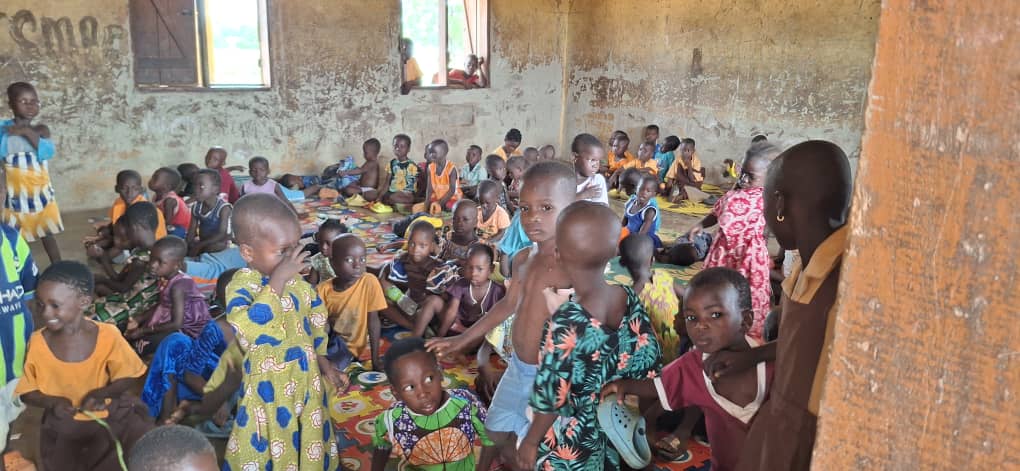The North East Region faces a significant lack of access to quality public kindergarten education, underscored by alarming statistics, as the Quality and Inclusive Early Childhood Education Project phase 2 (QAIECE 2) is launched to address these pressing educational challenges for children.
Statistics from Children Believe show that the North East Region has one of the highest rates of children out of school, with a national average of 18.4 percent of children lacking access to quality kindergarten education, while the North East Region has a staggering 42.4 percent.
Specifically, the region reports 42.4 percent of children aged 4 to 5 years, 30.7 percent of those aged 6 to 11 years, 32 percent of children aged 12 to 14 years, and 38.9 percent of youth aged 15 to 17 years who are not receiving early childhood education.

This indicates a troubling trend of many children in the North East Region being deprived of essential early educational opportunities. In response to these educational challenges, the Korean International Cooperation Agency (KOICA) and ChildFund Korea (CFK) have donated USD 1.8 million to construct classroom blocks for 30 communities across two municipalities in the North East region.

The initiative aims to enhance the quality of public kindergarten basic education, supporting the physical, cognitive, and socio-emotional development of 4-5 year-old children.
The QAIECE 2 project, aimed at enhancing quality and inclusive early childhood education services in North East Ghana, was officially launched with support from the Korean government through the Korea International Cooperation Agency (KOICA).

At the launch event, the Director for Children Believe, Esinam Kavi De Souza, emphasized the significance of this project, which builds upon the foundations established in Phase 1 of the QAIECE initiative, implemented from April 2022 to December 2025.
The project is a collaboration among three organizations: Children Believe, ChildFund Korea, and AG Care, all committed to promoting child development and participation.

According to her, the Quality and Inclusive Early Childhood Education project aligns with Ghana’s educational policies, particularly the Early Childhood Education Policy Framework endorsed in 2020, and aims to ensure the availability of kindergarten spaces, improve the implementation of the kindergarten curriculum, provide training for educators, engage families in the learning process, and promote social justice for marginalized children.
The Director for Children Believe Esinam Kavi De Souza, urged local government authorities to prioritize early childhood education in their development plans and called for increased government budget allocations to strengthen early childhood education as a foundation for the nation’s future.

Dong Hyun Lee, the KOICA Country Director admonished that, the launch of the QAIECE 2 Project not only highlights the urgent educational needs in the North East Region of Ghana but also showcases the unwavering commitment of KOICA to the future of children in the country.
Mr. Dong Hyun Lee emphasized that the remarkable growth observed in Korea over the past years can be attributed to strategic investments in education. He stated, “Real change occurs when communities understand the challenges they face, embrace the responsibility and lead the necessary transformations themselves. It is the active involvement of local communities that will drive meaningful progress in this nation.”
Mr. Lee further expressed the Korean government’s steadfast dedication to investing in education as a pivotal strategy for fostering community growth and development. He articulated that education is not merely about imparting knowledge; it is about equipping children with the tools they need to thrive and contribute positively to society.

Ibrahim Tia, the North East Regional Minister, expressed his heartfelt appreciation for the initiative undertaken by KOICA in launching the QAIECE 2 Project. He acknowledged the crucial role that such partnerships play in addressing the educational challenges faced by the region, stating, “This project is a significant step towards ensuring that our children receive the quality early childhood education they deserve.”
In his address, Minister Tia called upon all other development partners and organizations to recognize and prioritize the unique needs of the North East Region.
He urged them to engage with local communities to understand their specific challenges and aspirations, emphasizing that “true development occurs when we listen to the voices of the people we aim to serve.”
He highlighted the region’s readiness to collaborate with any entity willing to invest in its future, declaring, “The North East Region stands poised to welcome development partners who are committed to supporting us in our journey towards sustainable growth and empowerment.”
He pledged his commitment to working alongside partners to create a brighter future for the children and families in the region.













